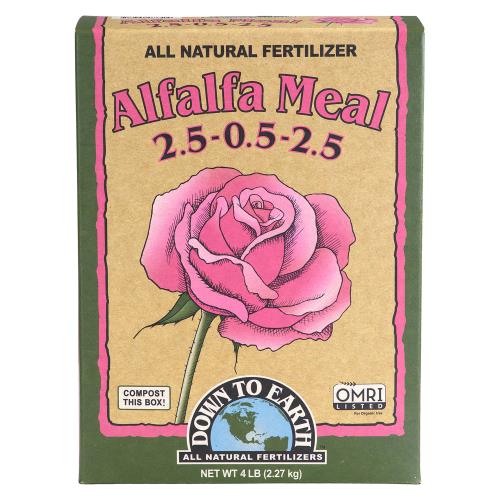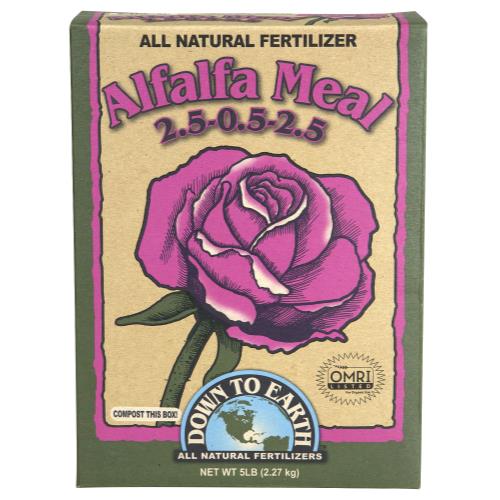Down To Earth
Down To Earth Alfalfa Meal
Down To Earth Alfalfa Meal
20 in stock
Couldn't load pickup availability
Payment options
- Fast Delivery
- Easy Returns
- Secure Checkout
Description
Description
Down To Earth Alfalfa Meal is a natural and organic fertilizer that provides a rich source of essential nutrients for your plants. Derived from sun-cured alfalfa plants, this high-quality meal is carefully processed to retain its nutritional value. It’s a versatile and sustainable choice for gardeners and farmers looking to promote robust plant growth while enhancing soil health.
Key Features:
1. Premium Alfalfa: This product is made from sun-cured alfalfa, ensuring that it contains a wealth of nutrients, including nitrogen, phosphorus, potassium, and various trace minerals.
2. Slow-Release Nutrients: The nutrients in alfalfa meal are released gradually, providing a steady and long-lasting supply of nourishment to your plants without the risk of over-fertilization.
3. Enriched Soil: Alfalfa meal not only feeds your plants but also improves the structure and microbial activity of your soil, making it an excellent choice for overall soil enhancement.
4. Non-GMO: Down To Earth takes pride in offering non-genetically modified alfalfa meal that aligns with environmentally conscious and ethical farming practices.
5. Versatile Application: This product can be used for a wide range of plants, from vegetables and flowers to shrubs and trees.
Benefits:
1. Organic Nutrient Source: Down To Earth Alfalfa Meal is a natural and organic fertilizer, making it an environmentally friendly and sustainable choice for plant nutrition.
2. Soil Improvement: Regular use of this meal can enhance your soil’s capacity to retain moisture and nutrients, improving its overall health.
3. Steady Growth: The slow-release nature of the nutrients in alfalfa meal promotes steady plant growth, resulting in healthy and vigorous plants.
4. Reduced Waste: By making use of alfalfa, a renewable resource, this product helps minimize waste and supports eco-friendly agricultural practices.
Applications:
Down To Earth Alfalfa Meal is suitable for various applications, including:
1. Vegetable Gardens: Boost the growth and yield of your vegetables while improving their nutritional content.
2. Flower Beds: Promote lush and vibrant blooms by enhancing soil fertility.
3. Fruit Orchards: Support the health and productivity of fruit-bearing trees and plants.
4. Sustainable Farming: An ideal choice for organic farming and enriching soils sustainably.
Usage Tips:
1. Apply alfalfa meal during planting or as a top dressing during the growing season.
2. For established plants, lightly incorporate the meal into the soil around the base of the plant.
3. Follow the recommended application rates and guidelines provided on the product label for the best results.
4. Water your plants after application to activate the nutrients and facilitate their absorption.
5. Store the product in a cool, dry place to maintain its quality.
Down To Earth Alfalfa Meal is an eco-conscious and natural fertilizer that nourishes your plants while enhancing the health of your soil. Whether you’re an organic gardener, farmer, or environmentally responsible grower, alfalfa meal offers a sustainable and effective way to support strong plant growth and eco-friendly agriculture.
Share
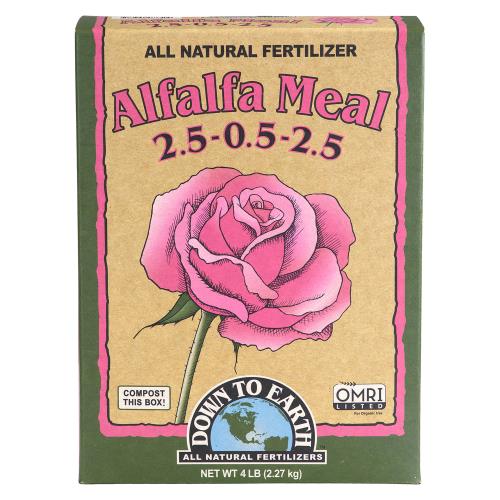
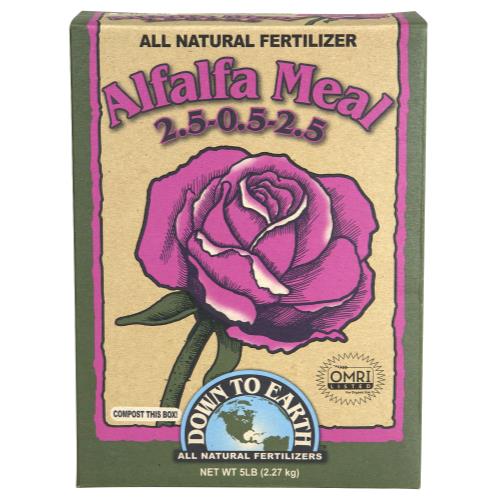
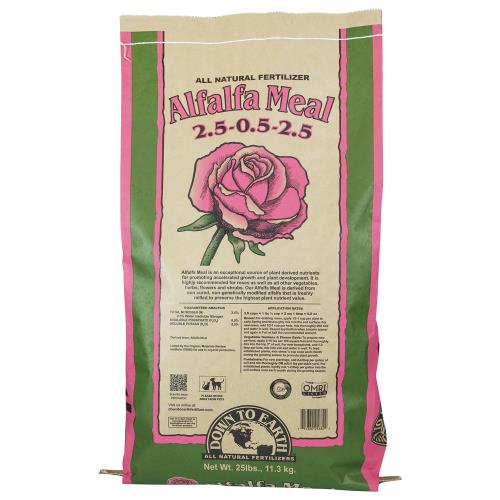
INFORMATION QUESTIONS
FREQUENTLY ASKED QUESTIONS
What is Hydroponics?
Hydroponics is the science of growing plants without soil. The plants thrive on the nutrient-water solution alone. The growing medium merely acts as a support for the plants and their root systems while the solution passes freely. The growing medium, if any, is totally inert.
What types of plants grow best hydroponically?
Anything can be grown hydroponically, but some plants prove to be more space efficient. Some plants we suggest are tomatoes, sweet peppers, hot chilies, lettuce, spinach, squash, cucumbers, broccoli, beans, snow peas, herbs and flowers of all types.
Can you REALLY get better yields/quicker growth?
Absolutely. The plants, when receiving everything they need, tend to be healthier, faster growing and generally more productive. You can expect 30% faster growth with many crops.
What are the watering cycle timelines hydroponic systems?
Once the reservoir is filled with nutrients, it is time to put your hydro system to work! The ease of hydroponics is automation – automation is achieved by putting the pump on a timer according to your watering needs. The watering cycle depends on growth stage, growing medium and hydroponic system. In an ebb and flow or drip system with rockwool as the medium, seedlings, clones and plants in the early vegetative stage require watering only once a day for 15-30 minutes (twice a day for higher temps). Mature, flowering and fruiting plants require a heavier feed and can be fed once a day for 30 minutes (twice a day for higher temps). Typically soiless mixes and coco fiber can be watered for about 15 minutes twice a day, and can be adjusted for heavier feeding during the flowering and fruiting stage or higher temps. ViaStone, Hydroton, Grow Rocks, and Silicate mediums need to be watered more frequently – a constant drip for drip systems, and about 15-30 minutes every 3 hours for ebb and flow systems and can be adjusted for heavier feeding during the flowering and fruiting stage or higher temps. Aeroponic systems require frequent watering cycles; 30-60 seconds every few minutes or a constant spray.
What do I need to test pH? How do I test pH?
pH has a range from 0 (acidic) – 14 (alkaline), with 7 being neutral. A proper hydroponic pH range is between 5.5 to 6.2 for most hydroponic crops. For specific crop pH, check out our Plant Guide. pH must remain within the proper range for good plant health, disease resistance, and proper nutrient uptake. pH is maintained by adding pH Up and pH Down to the nutrient solution. For more information, see the Testssection of our site.
How will the flavor compare to my outdoor grown, organic produce?
The taste may be even better! This is simply due to the fact that the hydroponically grown plants are getting everything they need, when they need it. Don’t be fooled by “hot house” produce grown commercially. The grower’s primary concern is shipability and storage, not flavor. When you grow your own vegetables at home, you can expect nothing less than excellent results. Plus, hydroponically grown produce has the added benefit of a longer shelf life.

